CIA Sponsored Terror, Civil Liberties, Criminalizing Dissent, Gaza, Guantanamo, Habeas Corpus, Human Rights, Political Prisoner, Surveillance, Torture, Truth to Power
Podcast: Play in new window | Download
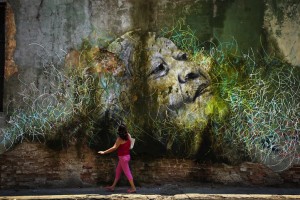
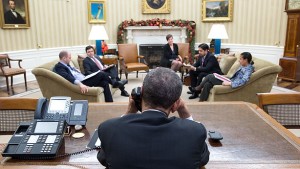
U.S. Cuban Foreign Policy Changes Strategy: Normalizing Relations
We’re joined today by attorney Michael Krinsky, a partner in the famous law firm of Rabinowitz, Boudin, Standard, Krinsky & Lieberman. This the firm that almost has been from the beginning representing the government of Cuba. We speak with Michael about the dramatic reversal of policy and the recognition by the United States of the Cuban government and the eventual establishment of joint embassies. We also speak about the returning to Cuba of the three remaining anti-terrorist Cuban fighters who have been in American prisons for 16 years. Three men of the Cuban Five. That, plus we discuss the changing of the commercial relationships between the United States and Cuba.
Attorney Michael Kinsky:
- It was an extraordinary moment. Word got around that Raul Castro was going to talk to the Cuban people on television at Noon, so everyone ran to find a television, including me.
- I think many people expected Obama to take some minor measures to test the waters perhaps to get things moving.
- Most people were quite surprised about the tone of his speech and what he said.
- I happen to be at a conference of US and Cuban scholars, which were talking about US-Cuban relations, that’s where I saw President Castro’s speech. The first thing he said of course was the cuban heroes. The 3 of the remaining Cuban Five and the place broke into pandemonium. People jumped up literally hugging each other. People were crying, then they quieted down and they listened to the next thing.
- And then when he said President Obama and I have agreed to reestablish normal diplomatic relations. There was silence. Then people half a second later absorbed and again there was a tremendous commotion.
- People felt a sense of triumph. After 55 years of holding despite the Bay of Pigs, despite the economic blockade, despite the special period when the trade with the Soviet Union collapsed, they had held on. In the end, someone put it, the United States came to us.
- You could see it in the streets, you could see it in the restaurants, you could see it in the offices. People were happy.
- They were literally smiling for days afterward.
- The embargo has been in effect for 54 years. It’s as comprehensive an embargo as this country has ever imposed, as any country has every imposed against any country.
- It’s not simply the US saying we the United States won’t trade with Cuba. A major part of it is extra-territorial reach. The effort for Cuba to make trade with third countries difficult and impossible.
- They can’t get US parts for their equipment.
- They can’t use US dollars for international transactions, which is the currency of international trade.
- Shipping to Cuba is made extremely difficult because of the US law that says if a ship goes to Cuba it can’t come to the United States for six months.
- Everyone in Cuba lives on a daily basis what they rightfully call a blockade.
- A blockade implies an effort to interrupt, disrupt trade between Cuba and a third country.
- There is nothing there about Cuban products being sold in the United States. It’s all one way.
- Cubans have developed a lot of innovative medical products that doctors are very excited about.
- There was nothing in the announcements about regular airplane service between the two countries.
- (Michael Ratner: The president has the authority to license almost everything, every economic transaction with Cuba at this point)?
- Right export, import, financial transactions, loans, credits, investments, all of these things are within the president’s licensing authority.
- The United States did not want a left wing socialist revolution to succeed in the Americas.
- The theme publicly and internally in the US government, until about 1991, 1992 and then there was a shift. Then for the first time, the United States publicly started talking about the goal of US policy including the blockade was to change the internal character of the Cuban system. The Cuban government.
- Civil liberties, free elections, free speech – those became for the first time the articulated goals of US policy.
- Guantanamo Bay used to be a Naval Station for coaling, ships operated on coal then. There was a 99 year lease between a captive Cuban government and the United States.
- I’m trying to find the right balance between a great deal of enthusiasm and not necessarily skepticism, but caution.
- It was nice to see the State Department make reference to this, the United States has claims for the nationalization the properties of its companies in Cuba in the early days. Cuba has articulated it has much greater claims against the United States for the blockade and for acts of economic sabotage which have died actually over the years.
- There are claims on both sides that have been articulated in the past.
Guest – Attorney Michael Krinsky, has been practicing law for forty-five years. For three decades, he has led the Firm’s representation of Cuba and other foreign governments, and their agencies and enterprises, as well as the Firm’s practice in the area of U.S. embargoes and export controls. Mr. Krinsky graduated from the University of Chicago’s College in 1965 and its Law School in 1968. After working with the American Civil Liberties Union in Newark, New Jersey, he joined the Firm in 1971.
——
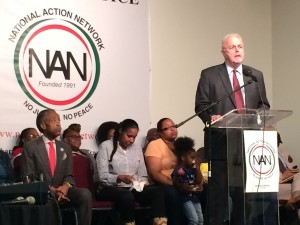
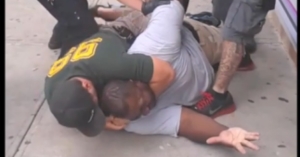
NYPD Unions Respond To Police Shootings, Says Protests At Fault
In the wake of the killing of two NYPD officers, a rift has widened amid police unions and the mayor of New York City. The New York City Police Benevolent Association Officers has suggested that the recent demonstrations against police misconduct and police violence have played a role in the execution style murders. To discuss the rhetoric from the police union and the tabloid media, we’re joined by attorney Jonathan Moore.
Attorney Jonathan Moore:
- It is a critical moment here in New York City and around the country on the issue of dealing with over aggressive policing and the militarization of police, I think they go hand in hand.
- We’ve been fighting this battle in New York for at least 15 years going back to the killing of Amadu Diallo and litigated the stop and frisk cases until the end of last year in to this year.
- Police unions have been an absolute impediment to any reform of the police department in the city of New York over the last several years.
- The union of that police department doesn’t reflect the membership anymore. The police department is close to being majority minority. Patrick Lynch is the vestiges of the old guard who never saw a police officer who did anything wrong.
- The overwhelming majority of these protests have been peaceful and law abiding. They have not been about calling for the death of police officers. They’ve been about calling for fair bias-free, constitutional policing.
- To use the death of these two officers as an attempt to stifle what as you say is growing mass movement, that hasn’t been seen in many years, is unfortunate and should be resisted.
- I’m glad that people are out there, these are important issues.
- The daily use of excessive force that goes on in many communities is never registered, never gathered by the police department. That’s a problem.
- The systemic problem is a culture within the New York City police department that has adopted an us against them mentality.
- There has to be a cultural change within the police department.
- In 2011, the police department was doing close to 700 thousand stops and frisks a year. The fear was that if you impeded the stop and frisks in the way they were doing it. We of course they were doing it based on race, and the federal court found that.
- Their alarmist response was if we stop doing stop and frisk, the crime rate will soar.
- They did 50 thousand stop and frisks this year, that’s down 650 thousand. That’s because they made a change. They stopped imposing quotas on police officers.
- By the way, on the pace of doing 50 thousand this year, and crime is still going down.
- What does that tell you. It tells you for all these years, they were unnecessarily harassing and stopping and frisking, young black men and young Hispanic men, mostly in our communities for no good reason.
- These unions blindly defend officers when they engage in misconduct and that hurts all police officers, all correction officers.
- In an organization like the NYPD of 35 thousand sworn officers, there are going to be people who don’t do what they should do. They should be rooted out and removed from the police department.
Guest – Attorney Jonathan Moore, is a civil rights lawyer known for his work in the stop and frisk suit against the city and representing 3 of the 5 wrongly convicted men in the Central Park jogger case in 1989. He is now representing the family of Eric Garner, a father of six who died from a police choke hold.
—————————————————

Please help support Law and Disorder by clicking on Fractured Atlas graphic (link is fixed). This radio show is now a sponsored project of Fractured Atlas, a non-profit arts service organization. Contributions for the charitable purposes of Law and Disorder must be made payable to Fractured Atlas only and are tax-deductible to the extent permitted by law. You can donate as little as 5.00 a month.
CIA Sponsored Terror, Civil Liberties, Criminalizing Dissent, Cuba, Guantanamo, Habeas Corpus, Human Rights, Military Tribunal, NSA Spying, Political Prisoner, Prison Industry, Prosecution of the Bush Administration, Surveillance, Torture, Uncategorized, War Resister
Podcast: Play in new window | Download
Updates:
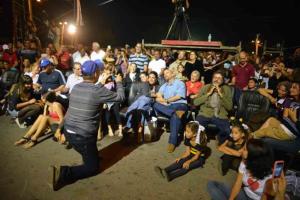
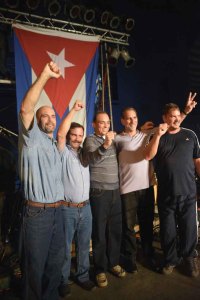
New Cuba-U.S.A. Pact And Remaining Cuban Five Prisoners Released
Attorney Michael Ratner:
- We’ve been covering this case for years on here. They were wrongfully convicted. They had been sent into Miami to stop Miami-Cuban terrorism against Cuba.
- The U.S. in a vindictive prosecution had sentenced them for many years, in fact one of them was sentenced to life in prison for conspiracy to commit espionage I think.
- It’s all part of a larger picture of what’s going on.
- Cuba in what’s not considered an exchange, of course obviously, released Alan Gross.
- Obama within limits sounds like he’s going to open relations within a certain way with Cuba and open an embassy in Cuba and Cuba, one in the United States.
- It’s amazing moment, the revolution took place in 1959, so that’s only 55 years ago approx, the embargo has been in effect since 1961. It’s still in effect of course but this is a really major moment.
- Attorney Len Weinglass would take 1 or 2 cases at a time, work on them like a dog, whether it was Mumia or in this case the Cuban Five and put every piece, every part of his life into it.
——
Attorney Heidi Boghosian:
- In the U.S. we continue to see the news portraying the five as spies when like you said they were really here to uncover unlawful activities on the part of the U.S government.
- They handed over files to the FBI, they were very forthright with the information they gathered.
- We also know from our interviews with attorney Mara Verheyden-Hilliard and Gloria LaRiva that the U.S. has been paying journalists in Miami to report negatively on the case of the Cuban Five and were doing so at the time of their trial.
- One of the lawyers we used to interview on this show and a close friend of ours Lenny Weinglass who passed away a couple of years ago was the main lawyer for the Cuban Five. It then became Martin Garbus who carried on the case in an extraordinary way, and I think that all of their work and all of the work of the Committee to Free the Cuban Five has led to result that I think would have been unforeseeable 20 years ago.
——
Civil Forfeiture Cases Follow Up
Michael Ratner Commends Dean of Columbia Law School Canceling Exams Allowing Option To Protest
International Criminal Court: Possible Prosecutions From U.S. Torture In Afghanistan
Happy Birthday Chelsea Manning
ECCHR Calls For 13 CIA Agents To Be Extradited To Germany
ECCHR Complaint Against Bush Era Architects Of Torture
Attorney Michael Ratner:
- It’s taking the Senate Report they did on detention and going further and saying now we actually have evidence from one of the branches of government admitting that the CIA engaged in this incredibly awful program of torture.
- Wolfgang Kaleck says there are about 500 CIA agents that should be quaking in their boots about traveling to Europe.
——
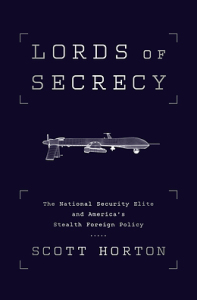
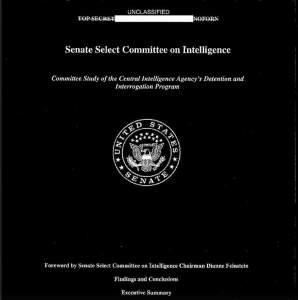
Senate Intelligence Committee Torture Report: Attorney Scott Horton
Guantanamo suicides, CIA interrogation techniques, CIA ordered physicians who violate the Hippocratic oath, are topics of some recent articles by returning guest attorney Scott Horton. Last month, he was on Democracy Now to debate former CIA General Counsel John Rizzo on the question of declassifying a Senate Select Committee on Intelligence report about the agency’s secret detention and interrogation programs. His book Lords of Secrecy The National Security Elite and America’s Stealth Foreign Policy will be published January 2015.
Attorney Scott Horton:
- I think the results flow directly from the media coverage (ABC poll on Torture report)
- Now major publications and broadcasters that hedged using the word torture have stopped doing that. There are only a handful of media sources that won’t do it. NPR being one of them.
- The media also presents roughly twice as much time devoted to people justifying the use of torture techniques to those criticizing it.
- Barack Obama who should lead the push back has gone completely silent. It’s beyond silent he talked about “tortured some folks” making it very casual, and then he said the torturers were patriots.
- I thought it was electrifying reading. 90 percent of it I’ve heard about before and still when you read them in this clinical, plain, highly factual style and things were developed with a continuous flow with lots of background in decision making in Washington at the top and how all this effected what happened on the ground.
- As a consumer of Congressional reports this probably the single most impressive Congressional oversight report I’ve ever seen.
- It’s an excellent example of what the oversight committee should be doing all the time.
- They’re doing this with respect to a program which was essentially or very largely wrapped up by October 2006.
- We’re talking about 8 1/2 years ago.
- They’re only able to do this kind of review in any depth when its historical, not when its real time oversight, that’s disappointing.
- One thing that emerges from looking at these reports and the military reports is that there is a huge black hole which has never been fully developed and explored and that’s JSOC, its the military intelligence side.
- That escaped review within the DOD process and it escaped review in CIA process and its clear that there’s a huge amount there.
- I certainly don’t expect prosecutions to emerge for the next couple of years in the United States, but I see a process setting in that may eventually lead to prosecutions.
- On the one hand we’re seeing a dangerous deterioration in relations with Russia, is an aggressor, which has seized territory in the heart of Europe, is waging a thinly veiled war on one of its neighbors. That is very unnerving to the major NATO powers.
- On the other hand there’s never been a period in the history of the alliance when there is so much upset at the United States.
- That’s come largely from the rise of the surveillance state and the role of the NSA.
- I was looking at this report, and we know that in 2006, there was an internal review that led the CIA to conclude that these interrogation techniques were ineffective and the CIA internally decided to seek a large part of the authority for EIT’s and operation of black sites rescinded.
- Another thing that’s very important here from this report, it tells us that Michael Hayden, George Tenant, Porter Goss and other very senior people at the CIA repeatedly intervened to block any form of punishment of people who are involved with torture and running the black sites.
- That’s important because of the legal document Command Responsibility. The law says when command authority makes a decision not to prosecute and immunize people involved with torture and abuse, that results in the culpability of these crimes migrating up the chain of command.
- I interviewed CIA agents who were involved in this program, and they told me they’ve all been brought out by legal counsels office and told – they may not leave the country.
- That means you’ve got roughly 150 CIA agents, including many people near the top of the agency who can’t travel right now.
- Lords of Secrecy The National Security Elite and America’s Stealth Foreign Policy
Guest – Scott Horton, human rights lawyer and contributing editor to Harper’s Magazine. Scott’s column – No Comment. He graduated Texas Law School in Austin with a JD and was a partner in a large New York law firm, Patterson Belknap Webb & Tyler. His new book Lords of Secrecy The National Security Elite and America’s Stealth Foreign Policy.
————————————————————————-
CIA Sponsored Terror, Civil Liberties, Criminalizing Dissent, FBI Intrusion, Habeas Corpus, Human Rights, Political Prisoner, Prison Industry, Surveillance, Targeting Muslims, Truth to Power
Podcast: Play in new window | Download
Updates:
- Hosts Discuss Mass Demonstrations In Wake Of Ferguson Grand Jury Verdict
—-
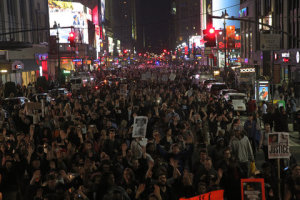

Mumia Abu Jamal Responds To Grand Jury Not Indicting Ferguson Police Officer Darren Wilson
We talk today about the wide scale pattern of police violence against people of color in the context of the grand jury decision in St. Louis, Missouri to not indict Ferguson police officer Darren Wilson for the fatal shooting of Michael Brown, an unarmed 18 year old African American. The decision sparked more outrage within the community of Ferguson and launched tens of thousands into the streets in cities across the country. The grand jury is comprised of 12 members and 10 out of the 12 would have to agree to indict. The grand jury had a number of choices, such as first degree murder, second degree murder, voluntary manslaughter or involuntary manslaughter. First degree murder would have required evidence that Wilson set out to kill Brown. Second degree murder charges were possible, but this choice was unlikely if jurors decided that Wilson was negligent when he shot Brown, they could have gone with a charge of voluntary or involuntary manslaughter.
Mumia Abu Jamal:
- When you think back through American history, there are actually few periods where you see this range of protest.
- You’ll see throughout the 20th century protest. Think about April 4, 1968, the day Martin Luther King Jr. was killed and you saw protests all across the country over hundred cities.
- And look what happened a few hours ago, perhaps a greater range of protest in over 170 cities tells you I think better than anything I can say, that things are very bad indeed for the African American community and their expectation of justice in this system.
- Think about the weather, people coming out in the dire cold, right, to protest at night. That’s not an easy thing, people don’t do that easily and they do it at considerable risk and some danger.
- That speaks to the depth of the feeling in their hearts that something is broken in the American justice system.
- The recent midterm election was the lowest turnout since the 1940s. That says something about American discontent with the political system.
- It actually reminds me about the demonstrations before the 2003 Iraq War, where all around the world in hundreds of countries you saw demonstrations that were unprecedented.
- People feel that. Now that can dissipate until a new provocation.
- This is the time where organizers should be on their p’s and q’s and out there taking phone numbers and taking emails and building lists.
- To stand up at this moment, the first African American president in America’s history and talk about that people need to observe and respect the rule of law is I think frankly absurd.
- Barack Hussein Obama was born August 4, 1961. In that year there were about 20 states that made it illegal for a white person to marry a black person.
- People went to jail for what they called interracial fornication.
- When you talk about the rule of law, you have to talk about the rule of right and the rule of wrong.
- To quote John Africa, who said just cause its legal don’t make it right.
- We live in a country that legalized slavery.
- Many things are done in the name of law, but they’re wrong, they’re simply wrong.
- I was reading in the USA Today last week, (I’m little behind in my reading) they said 461 people were killed by police in 2013.
- This is something that’s systemic in the United States, and the people are trying to draw attention and I don’t think its successful, but its a damn good beginning.
Guest – Mumia Abu-Jamal is a renowned journalist from Philadelphia who has been in prison since 1981 and was on death row since 1983 for allegedly shooting Philadelphia police officer Daniel Faulkner. After decades of appeals, he left death row in 2012 but is still facing a life sentence. He is known as the “Voice of the Voiceless” for his award-winning reporting on police/state violence brutality and other social and racial epidemics that plague communities of color in Philadelphia and throughout the world.
—-

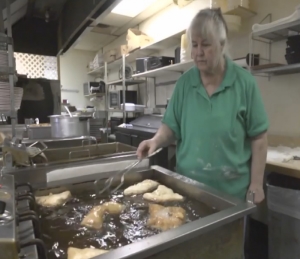
Civil Forfeiture: Federal Government Seizes Property Of Business Owners
In May of 2013, two Internal Revenue Service agents seized the checking account of Carole Hinders and the 32 thousand dollar balance. Hinders was accuses of structuring her deposits to be less than 10 thousand dollars to avoid filing required government reports. This is a tactic often used by drug dealers and other criminals to move money around without detection. However, Carl Hinders owns a Mexican restaurant and her business is cash only. She did explain to the IRS agents that she made deposits almost daily to avoid having thousands of cash on hand. Hinders wasn’t charged with a crime, yet the IRS still seized the money. There are many cases of civil forfeiture similar to Carol’s where the property is taken without proper due process and investigation.
Attorney Larry Salzman:
- Civil forfeiture is a set of laws that allow government agencies to take your property when they suspect its been involved in crime but they don’t need to charge you with any crime to take that property.
- One of the incredible things about civil forfeiture is that the agencies that seize your money based on a mere suspicion actually get to keep that money to fund their agencies.
- That’s true in most states and also for the federal law.
- Every state is engaged in civil forfeiture. Minnesota had a reform. They no longer use strictly civil forfeiture, they’ll only take your property after you’ve been convicted of a criminal offense.
- The federal government uses it (civil forfeiture) almost every major agency of the federal government, the Drug Enforcement Administration, the IRS, the DHS, ICE.
- You can’t have both civil forfeiture and an impartial enforcement of the law if the agencies enforcing that law get the money.
- In federal cases there’s another lack of due process. The federal agencies seize cash like a bank account, the law doesn’t provide any prompt post seizure hearings. So, there’s no right for you to quickly contest the validity of the seizure. You might wait a hear without your money before you get to see a judge.
- It’s very hard to get it back because it means mounting a full scale defense in state or federal court against well funded prosecutors.
- There’s that financial incentive, so the government is doing more and more of these civil forfeitures as their budgets are coming under constraint.
- If local law enforcement involves themselves in a federal forfeiture action, they’ll get paid a bounty by the feds for their participation. That becomes a very meaningful part of police department budgets.
- That equitable sharing program has ballooned from nothing to something over 450 million dollars a year given to local police departments.
- We’re seeing it again with another set of clients. We have 3 brothers who own a convenient store distribution business on Long Island, the IRS again took 446 thousand dollars from them.
- This is a modest business almost all of that money was money that was owed to vendors for inventory. They grabbed their bank account when it was its fullest basically. The allegation again was structuring.
- There’s not even a civil forfeiture action that’s been filed, that’s a violation of law in itself the government’s committed.
- Many of the worst aspects of civil forfeiture were ushered in on the premise that they were needed to combat drug trafficking but now we see civil forfeiture being used to treat legitimate small businesses like criminals, just because they’re making frequent cash deposits.
Guest – Attorney Larry Salzman is with the Institute for Justice. He joined the Institute in April 2011 and litigates cutting-edge constitutional cases protecting individual rights, including free speech, property rights, and economic liberties, in federal and state courts. He is originally from San Diego. His commitment to both entrepreneurship and law is reflected in his career prior to joining IJ. Larry co-founded an ecommerce company with his family in 2000, while attending law school at night, and returned to the business for several years as CEO upon its sale in 2007. During the interim, he was an attorney with Pacific Legal Foundation, in Sacramento, California, litigating property rights cases in federal and state courts, and served as a clerk to Judge Bohdan A. Futey on the United States Court of Federal Claims. Larry received his law degree in 2002 from the University of San Diego, where he was Assistant Editor of the San Diego Law Review. He received an undergraduate degree in Finance from Arizona State University in 1993.
——————————————————————————————————————————–
Civil Liberties, Criminalizing Dissent, Gaza, Habeas Corpus, Human Rights, Military Tribunal, NSA Spying, Political Prisoner, Surveillance, Targeting Muslims, Truth to Power, War Resister
Podcast: Play in new window | Download
Updates:
- RE/MAX Cashes In On Israel’s Illegal Settlements – Code Pink Calls For RE/MAX Boycott Campaign
- US Senate Votes Down USA Freedom Act
- Michael Ratner: President Obama Doesn’t Need Legislation To Stop The NSA, He Can Simply Direct the NSA Not To Collect Meta-Data
—–
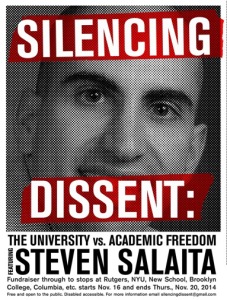
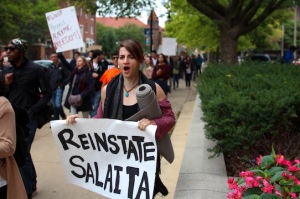
Academic Freedom Case Gains Traction
Since the University of Illinois at Urbana-Champaign Board of Trustees rejected Professor Steven Salaita’s candidacy for a tenured faculty appointment to the American Indian studies program, Salaita has been giving presentations about his case and the importance of academic freedom. Initially we reported here on Law and Disorder that Professor Salaita was un-hired from the American Indian Studies program at the University of Illinois at Urbana-Champaign because of his statements on social media criticizing Israel’s conduct of military operations in Gaza. Emails within the University revealed under Freedom of Information Act Requests show that it was outside pressure from donors that influenced the University of Illinois Chancellor’s decision to dehire Salaita.
Professor Salaita:
- My Dad grew up in Jordan, my Mom in Nicaragua. I grew up in West Virginia.
- I got my undergraduate and Master’s degree from a small regional college in south west Virginia called Radford University and I got my PhD in Native American Studies from the University of Oklahoma.
- My interest in Native American studies developed from a Native American novel course I took in college. It generated a profound interest in the histories of settlement and dispossession in North America which struck me as similar in important ways to the forms of dispossession that Palestinians have suffered in the Middle East.
- I submitted my application in October of 2012. I was offered the job in September of 2013. Signed the contract of October of 2013.
- The contract was countersigned by university officials and it was made formal. At that point it was announced that I had accepted the job.
- The process was nearly 2 years long from submission of the application to the signing of the contract.
- Any search process in the humanities or social sciences starts with a search committee of 4-6 people. They’ll look over a candidate’s cover letter. They’ll examine a candidate’s scholarship and they’ll examine that scholarship in detail.
- Once the search committee has made its selection it has to go to other committees throughout the university. A committee composed of representatives from the college. In my case the college of liberal arts and sciences.
- Because I was coming in with tenure I also had to be vetted by external referees, anywhere from 4 to 6. They basically read all of my scholarship. I had to send them all of my books, all of my scholarly articles, my teaching dossier.
- Given the statements that Israeli leaders have made, “mowing the lawn in Gaza”, “putting the people in Gaza on a diet” and their long standing discourse about demographic threats and a surplus of Palestinians . . . its hard not to think about those statements and debates when Israel carpet bombs an area twice the size of Washington DC land area that’s also home to 1.8 million people – you can’t help but think its a sort of violence informed by something worse than mere military strategy.
- A right-wing website run by (nominally) Tucker Carlson, the bow-tied gentleman formerly of Crossfire. He’s like he came out of a Republican lab. He wears a bow-tie his name is Tucker.
- His website the Daily Caller, ended up publishing a standard right wing hit piece. We’ve seen them all. Salaita, his tweets are horrible, blah, blah, blah, and by the way he’s going to start a job at the University of Illinois.
- Then the local rag in Urbana Champaign, the News Gazette picked up on the Daily Caller story and the controversy gained steam. The next thing I know I’m receiving an unceremonious termination letter from the chancellor.
- She said she didn’t expect trustee approval so there was no need to show up.
- They called me uncivil then it morphed into anti-semitic.
- Uncivil – – It’s a term that’s deeply rooted in colonial violence, that always implies something sinister without ever having to explain its intent or its meaning.
- It’s a wonderful term for shutting down debate. The entire southern hemisphere was colonized based on notions that they were uncivilized.
- The support has been phenomenal. Sixteen departments at the University of Illinois have voted no confidence in the chancellor and the board of trustees.
- I’ve also received support from the Center For Constitutional Rights, the Modern Language Association, a number of trade unions have passed resolutions condemning the university’s decision and demanding my reinstatement.
- The impulse seems to shut down the debate or discussion before it even begins.
- First of all we feel that its a matter of great import to the public interest that the university administration has arbitrarily taken an action that has had negative consequences for the reputation of the university and its ability to function normally.
- As you know the university is undergoing a boycott. It’s normal functions are being disrupted.
- Support Steven Salaita
Guest – Professor Steven Salaita, former associate professor of English at Virginia Tech. He is the author of six books and writes frequently about Arab Americans, Palestine, Indigenous Peoples, and decolonization. His current book project is entitled Images of Arabs and Muslims in the Age of Obama.Steven grew up in Bluefield, Virginia, to a mother from Nicaragua (by way of Palestine) and a father from Madaba, Jordan. Books by Salaita
—-

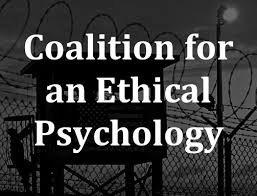
Independent Investigation of APA Ties with Torturers Under Bush Administration
The nation’s largest organization of psychologists is set to conduct an independent review into whether it colluded with or supported the government’s use of torture in the interrogation of prisoners during the Bush administration. In 2011 we reported on health professionals being front and center and complicit in the US policy of torture. The torturers relied heavily on medical opinion. Medical professionals provided sanitizing and rationalization for the infamous torture memos. During water boarding procedures, a doctor would be present. Psychologists were directly involved in the supervision, design and execution of torture at US military and intelligence facilities. This is a violation of state laws and professional ethics. These “health professionals” that were involved with torture still hold their professional licenses to practice.
Dr. Stephen Soldz:
- At this point I think we all know there was a program of torture in the Bush Administration. CIA and the DOD at Guantanamo. Less known was that psychologists were central to it.
- In the CIA, they designed the torture, they were also essential to the legal protection. The Justice Department torture memos basically said that if a health professional, a psychologist or physician is there and says that the interrogation won’t cause severe and long lasting mental harm, than it isn’t torture even if it causes harm.
- In other words, their presence was a get out of jail free card.
- As far as we can see it was central to the Bush Administration’s plans to indemnify themselves while engaging in torture.
- The American Psychological Association apparently worked with the Bush Administration to provide protection for the psychologists who were involved.
- The ethics code had been changed in such a way that it allowed psychologists to disobey the ethics code and follow governmental orders.
- This was actually done before 911 and passed after 911.
- We have been concerned if they (APA) had been complicit in various ways. James Risen from the New York Times just published his new book Pay Any Price and one chapter in there provided direct documentary evidence that APA officials were working with the CIA and the Whitehouse to manipulate the ethics code to apparently allow psychologists to participate.
- Michael Ratner: There was a committee appointed from the APA to look into the APA’s role as I recall . . . Dr Stephen Soldz: . . . to decide on whether psychologists participating in a national security interrogation was ethical – was consistent with the APA’s ethics code.
- They (APA) were not directly involved as far as we know in torture, they were more involved in doing what the CIA and the White House wanted in terms of manipulating ethical understandings.
- We, Amnesty and CCR have called for an independent investigation of the APA for a number of years. We’re glad the APA board has recognized the need.
- They appointed a Chicago attorney who is a specialist in public corruption. We are cautiously optimistic but we have some concerns.
- Its inappropriate for the APA board to appoint its own investigator of whether the APA did something wrong.
- The time frame they gave of 5 months is awfully short for an investigation of this magnitude. We’re hopeful that the investigation will be wide ranging and comprehensive which is what is needed.
- If the accusations in Risen’s book pan out, you have to look at his office (APA CEO) If he knew that means he approved of it. If he didn’t know that means he was incompetent.
- This has been the issue that has divided the APA in the last decade.
- What was most needed by the intelligence community was that it was ethical for the psychologist to participate in the interrogation.
- One of the key people who was in the Bush White House at this time who is implicated is Susan Brandon who is now a top official in Obama’s high value detainee interrogation group.
- If the Republicans win, torture will probably come back.
- Since the Nuremberg trials where Nazi doctors were executed for conducting unethical experiments, informed consent has been the backbone of human subjects research.
- Yet the APA put in this clause – – if laws or institutional regulations (that’s a very broad category institutional regulations) don’t require informed consent and psychologists don’t have to do it.
- If my drug company says I don’t need informed consent . . .there’s no reason why the APA should get rid of informed consent for anything but the most trivial and harmless research.
- They’ve never explained where this comes from and its still in effect.
- Ethicalpsychology.org
Guest – Dr. Stephen Soldz, psychologist, psychoanalyst, and public health researcher in Boston, and was a co-author of PHR’s report Experiments in Torture. He is the Director of the Center for Research, Evaluation, and Program Development at the Boston Graduate School of Psychoanalysis. He was Adjunct Assistant Professor of Psychology (Psychiatry) at Harvard Medical School, and has taught at the University of Massachusetts Boston, Boston College, and Boston University.
———————————————————————————

Please help support Law and Disorder. This radio show is now a sponsored project of Fractured Atlas, a non-profit arts service organization. Contributions for the charitable purposes of Law and Disorder must be made payable to Fractured Atlas only and are tax-deductible to the extent permitted by law. You can donate as little as 5.00 a month.
Afghanistan War, CIA Sponsored Terror, Civil Liberties, Criminalizing Dissent, Guantanamo, Habeas Corpus, Human Rights, Prison Industry, Targeting Muslims, Torture, Truth to Power
Podcast: Play in new window | Download
Updates:
- Michael Ratner: U.S. President Barack Obama To Seek Additional War Powers From Congress
——
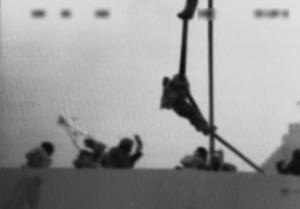
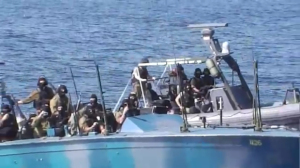
ICC Says Gaza Still Occupied, Israel May Have Committed War Crimes, But Court Refuses To Hear
Attorney Michael Ratner:
- When I’m in Berlin I see there’s a ICC decision by the prosecutor.
- People probably remember the attack on the Gaza flotilla, particularly the Mavi Marmara. One of 8 boats that were sent from Europe and other places, Turkey, to try and break the blockade that Israel had imposed on Gaza.
- Israel has been blockading Gaza forever essentially but it put in a very serious naval blockade in 2009 and no boats from the Mediterranean could approach within 20 miles of what Israel called its blockade.
- The Gaza Flotilla was established in 2010 to try and break the blockade it had 8 ships, one was named the Rachel Corrie.
- They were at least 80 miles away from Gaza, hadn’t even got into the blockaded territory when the Israeli commandos, the IDF made a raid on those boats.
- Particularly on the Mavimarmara which was a Turkish boat – the fact that the boat was registered in Comoros gave the ICC jurisdiction over the raid.
- People may recall the raid. Israeli commandos shimmied down on ropes from helicopters on to the Mavimarmara and they killed 9 people. A tenth died later.
- Ultimately, Comoros made a complaint to the ICC that – Israel attacked this flotilla even outside the 20 mile blockade zone, they committed war crimes. War crimes in that they were attacking civilian boats. War crimes in that they were killing civilians.
- Here I am sitting in Berlin thinking about the 76 anniversary of Kristallnacht, the tearing down of that wall, Raji Sourani from Gaza not being able to get in, and this ICC decision comes down.
- The ICC prosecutor says there’s a reasonable basis that war crimes were committed by the IDF in their attack on the Gaza Flotilla.
- The next sentence said as part of that finding Gaza was an occupied territory of Israel. That’s of great significance because when you’re an occupying force the laws of war apply. If you commit war crimes, if you kill people – civilians or intentionally targeting them or attack civilian objects.
- The third sentence is while we find that there was a reasonable basis that the IDF committed war crimes and that Israel continues to occupy Gaza despite its claim in 2005 that it left Gaza we are not going to take jurisdiction and further investigate the case, because the crimes were not essentially severe enough, big enough, enough of them . . . and therefore we’re not going to take this case.
- To look at them in an isolated way and not part of a stream of war crimes Israel has been committing since 1948 is outrageous.
- The Situation on Registered Vessels of the Union of the Comoros, the Hellenic Republic and the Kingdom of Cambodia
Law and Disorder Co-host Attorney Michael Ratner, President Emeritus of the Center for Constitutional Rights (CCR), a non-profit human rights litigation organization based in New York City and president of the European Center for Constitutional and Human Rights (ECCHR) based in Berlin. Ratner and CCR are currently the attorneys in the United States for publishers Julian Assange and Wikileaks. He was co-counsel in representing the Guantanamo Bay detainees in the United States Supreme Court, where, in June 2004, the court decided his clients have the right to test the legality of their detentions in court. Ratner is also a past president of the National Lawyers Guild and the author of numerous books and articles, including the books Who Killed Che? How the CIA Got Away With Murder, The Trial of Donald Rumsfeld: A Prosecution by Book, Against War with Iraq and Guantanamo: What the World Should Know, as well as a textbook on international human rights.
———

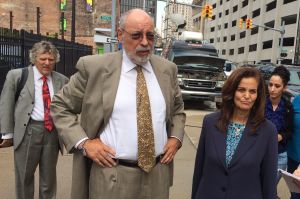
U.S. Government Finds 67-year-old Palestinian-American Rasmea Odeh Guilty
Earlier this summer we reported on Rasmea Odeh’s case. She’s a 67 year-old Palestinian American, community activist and teacher. In the fall of 2013, she was arrested by Department of Homeland Security for failing to disclose a 1969 conviction in an Israeli military court and charged with unlawful procurement of naturalization. Odeh, her father and fiancee were brutally tortured in an Israeli prison in 1969, which was related to a bombing in a Jerusalem supermarket. Israelis extracted a confession from Odeh and she spent 10 years in an Israeli prison where she was tortured and sexually assaulted.
Last week, Rasmea Odeh was found guilty of one count of Unlawful Procurement of Naturalization. For over a year, Rasmea, her supporters, and her legal team have been battling this unjust government prosecution, saying from the start that the immigration charge was nothing but a pretext to attack this icon of the Palestine liberation movement. And although there is real anger and disappointment in the jury’s verdict, it was known as early as October 27th that she would not get a full and fair trial, because Judge Gershwin Drain made it nearly impossible for her defense.
Attorney Michael Deutsch:
- This case emanates from the FBI and the US Attorney in Chicago investigating the work of the Arab American Action Network and other people who were doing Palestine solidarity work in the Chicago area and throughout the Midwest.
- They were bringing speakers here from Palestine to educate people
- As a result of that work they were targeted by the FBI. Ultimately in September of 2010, the homes 7 activists were invaded. All their political material was taken. There was a Grand Jury that convened and 23 activists were subpoenaed and they also sought the records of the Arab American Action Network.
- The U.S. Attorney of Chicago sent a request to Washington to look into the records of Odeh in Israel.
- After several years, the Israelis came up with documents that showed she was arrested in 1969, put on trial by a military tribunal in the Occupied Territories.
- . . found guilty, horrifically tortured, confessed as did her co-defendants, sentenced to life in prison, put in an Israeli prison, tried to escape in 1975, caught in a tunnel, trying to get out.
- As a result of this they looked at her Naturalization application and saw that she said no as to whether she had ever been arrested, convicted or in prison and the commenced a criminal investigation and indicted her 9 years after she had gotten her citizenship. Months before a statute of limitations would have run on this charge.
- We put forward a multi-level defense. One, we said that anything that was produced by the military court, the military judicial system was illegitimate, illegal – you’re tried by soldiers posing as judges. We said that she had been horrifically tortured and we had someone evaluate her over many days and hours, this woman who is one of the leading experts on torture said she (Rasmea) still suffers from PTSD.
- That would have caused her when she filled out the application to cognitively block what had happened to her 40 years prior in Israel and therefore she wasn’t intentionally lying.
- The judge refused all our motions, all our defense. He wouldn’t let her (Rasmea) testify about her torture, about her condition, or her innocence. All that was blocked by motions of the government.
- We went to trial basically with our hands tied behind our backs.
- What was a shock to me was the judge locked her up, pending sentencing. Now she sits in a county jail in Port Huron, Michigan for five months before the sentencing and obviously if the judge is not going to give her bail pending sentencing, he’s not going to give her bail pending appeal.
- Judge Gershwin Drain who is African American who at first was kind of sympathetic and supportive and initially said we were allowed to put on our PTSD expert and put on a PTSD defense. Then all of a sudden the government put a move to reconsider, he changed his mind and basically gutted our trial.
- We know of efforts all over the country to suppress student activity (around issues of Israel – Palestine)
- We have to convince the judge to let her out on an appeal bond. Even after all that if she’s sentenced, she’s going to go to prison and then when she’s done with her prison sentence, they’re going to put in her into immigration prison and they’re going to deport her.
Guest – Attorney Michael Deutsch, after clerking for United States Court of Appeals Judge Otto Kerner, Mr. Deutsch went into private practice, joining People’s Law Office in 1970 where he has represented political activists and victims of police and government civil rights violations. His advocacy has taken him all around the world, including to hearings in the United Nations. He has tried many civil and criminal cases in federal and state courts, and has written and argued numerous appeals, including several in the United States Supreme Court.
—–


Food Chains Documentary Film Opens Nationwide This Week
The documentary film Food Chains opens nationwide in the United States this month. The film brings you into the world of a Florida farmworker led effort to hold responsible the 4 trillion dollar global supermarket industry. The CIW is doing so through the Fair Food program. That’s the program which partners growers and retailers to improve working conditions for farm laborers in the United States. For years, farmworkers often endure abuse, wage theft, and have been beaten and sexually harassed. Food Chains’ producers include Eva Longoria and Eric Schlosser. Find out about screenings and action to take at www.ciw-online.org
Saturday November 22 – 1:00pm: Screening of Food Chains & Post-film Panel CIW-Quad Cinema (34 W 13th St) Food Chains also playing on Sat. Nov 22 at 7:45pm
Protest & March to Wendy’s Meet at Union Square Wendy’s (20 E. 14th St) Facebook
Guest – Gerardo Reyes Chavez, has worked in the fields since age 11, first as a farmer in Zacatecas, Mexico, and then in the fields of Florida picking oranges, tomatoes, and watermelons. He joined the Coalition of Immokalee Workers, a Florida-based human rights organization, shortly after his arrival in the United States in 2000, when his fellow farm worker roommates, who had previously escaped a violent slavery operation hidden in the swamp south of Immokalee, Florida, invited him to come to the CIW’s Wednesday evening community meetings.
——————————————————————————

Please help support Law and Disorder, the show is now a sponsored project of Fractured Atlas, a non-profit arts service organization. Contributions for the charitable purposes of Law and Disorder must be made payable to Fractured Atlas only and are tax-deductible to the extent permitted by law.





















